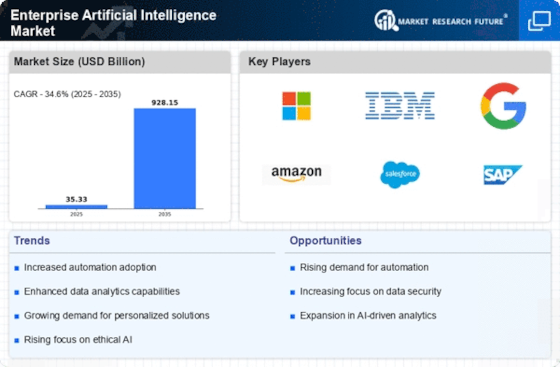Top Industry Leaders in the Enterprise Artificial Intelligence Market

Competitive Landscape of the Enterprise AI Market: A Bird's Eye View
The enterprise artificial intelligence (AI) market is experiencing explosive growth, fueled by the promise of improved efficiency, automation, and data-driven decision-making. Navigating this dynamic landscape can be daunting, but understanding the key players, their strategies, and the factors influencing market share is crucial for any organization considering AI adoption.
Key Players:
-
SAS Institute (U.S.)
-
International Business Machines (U.S.)
-
Microsoft Corporation (U.S.)
-
Amazon Web Services (U.S.)
-
Intel Corporation (U.S.)
-
Google LLC (U.S.)
-
SAP SE (Germany)
-
Sentinent Technologies (U.S.)
-
Oracle Corporation (U.S.)
-
Hewlett Packard Enterprise (U.S.)
-
Wipro Technologies (India)
Strategies for Success:
-
Specialization: Players are increasingly focusing on specific industry verticals or problem domains to gain deep expertise and offer tailored solutions.
-
Partnerships and Acquisitions: Collaborations with other AI vendors, technology companies, and system integrators are key to expanding reach and offering comprehensive solutions. Acquisitions are used to acquire talent, technology, and market share.
-
Open Source and Cloud Adoption: Open-sourcing AI tools and libraries fosters community development and accelerates innovation. Cloud-based delivery models provide flexibility, scalability, and lower costs.
-
Focus on Explainability and Trust: As AI becomes more complex, ensuring explainability and building trust in its decisions are critical for enterprise adoption.
Factors for Market Share Analysis:
-
Breadth and Depth of Offerings: The range of AI solutions offered and their depth of functionality are crucial factors.
-
Industry Expertise: Understanding the specific needs and challenges of different industries allows for tailored solutions and better customer engagement.
-
Ease of Integration and Deployment: Seamless integration with existing enterprise systems and user-friendly interfaces are key for successful adoption.
-
Pricing and Licensing Models: Flexible pricing models and clear licensing terms are essential for attracting diverse customers.
-
Customer Success and Support: Demonstrating the value of AI through concrete case studies and providing robust support are crucial for long-term customer retention.
New and Emerging Companies:
The AI landscape is constantly evolving, with new players emerging in areas like edge computing, natural language processing, and computer vision. These companies are often at the forefront of innovation, offering cutting-edge solutions that established players may not yet have.
Current Investment Trends:
-
Vertical AI solutions: Investors are increasingly focusing on companies offering AI solutions tailored to specific industries like healthcare, finance, and manufacturing.
-
Explainable AI: Companies developing tools and techniques to make AI decisions more transparent and interpretable are attracting significant interest.
-
AI for Business Process Automation: Solutions that automate repetitive tasks and improve operational efficiency are gaining traction across industries.
-
AI at the Edge: Companies developing AI solutions that can operate on edge devices without relying on centralized cloud infrastructure are seeing growing interest.
Latest Company Updates:
-
Microsoft and General Motors Partner on AI-powered Manufacturing: GM will leverage Microsoft's Azure AI platform to optimize production processes and predict equipment failures.
-
IBM Expands AI Offerings with Watson Assistant Enhancements: IBM announced new features for its popular AI assistant, focusing on improved personalization and multilingual capabilities.
-
OpenAI Launches ChatGPT Update with Improved Safety and Factuality: The popular generative AI model received an update aimed at addressing concerns about bias and misinformation.










